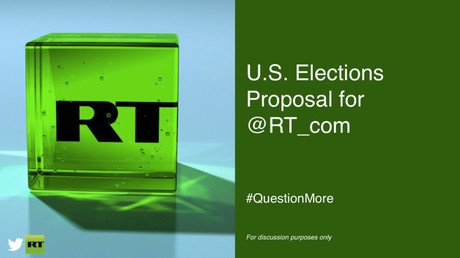Washington Post breaks ranks with other US & UK media, ADMITS polls show Crimeans prefer to be part of Russia
One of the curious things about Western media coverage of Crimea since 2014 has been the consistent narrative that Russia's reabsorption of the peninsula was carried out against the will of locals.
Look, you can make legitimate arguments about international law and the way the process was carried out. But attempts to give the impression Moscow somehow dragged residents kicking and screaming into the Russian Federation have always been ridiculous.
The overwhelming majority of Crimeans want to be part of Russia. This fact is not disputed by any credible expert on the post-Soviet space and is also borne out by opinion polling, including surveys carried out by American and German companies.
For proof of which side feels more confident in its version of events, look at the attitudes to press access to Crimea in Ukraine and Russia. As far as Moscow is concerned, if a reporter – or anyone else, for that matter – wants to visit the peninsula, all they need is a bog-standard Russian visa, and off they go. However, Kiev has made it clear that any journalist who travels to Crimea, without its permission, will be banned from Ukraine; a severe impediment to anyone working on this beat for a western outlet.
Also on rt.com Crimea declares independence, seeks UN recognitionTo be approved by the Ukrainians is not easy. First, you need to visit Kiev, then apply, in person, for a permit, before waiting a few days for approval. If you get it, then an eleven-hour drive, on poor roads for most of the route, awaits to Simferopol. This is because Ukraine has shut down all rail and air connections.
Now, let's be honest, if Kiev felt that the majority of locals wanted to return to its control, it wouldn't have erected these barriers. Instead, officials there would be encouraging every Tom, Dick, and Harry to roam around Crimea with abandon and report back about how much the locals want to be freed from Moscow's shackles.
But, in reality, they don't, and the Ukrainians know it. Hence why they make it so difficult for foreigners to go there and see it with their own eyes.
This week, one newspaper broke ranks, to a certain degree. The Washington Post published an oped under the headline: “Six years and $20 billion in Russian investment later, Crimeans are happy with Russian annexation.” Of course, the editors are basically trying to imply that Moscow bought off locals, but at least it's a sliver of light in over a half a decade of darkness.
The authors point to a December Levada poll they commissioned, which showed 82 percent of locals still support joining Russia, practically unchanged since 2014. However, their most significant finding is that 58 percent of Tatars are now satisfied with Russian control, compared to 39 percent six years ago. Tatars are a Muslim group that make up about an eighth of the peninsula's population. Levada, for the record, is an independent polling company.
Also on rt.com Overwhelming majority in Crimea today would still vote to join Russia – German surveyThe reason this is so interesting is that the entire Western media and think tank narrative about Crimea hinges on the notion that Moscow is oppressing the Tatars. It's also the primary basis of Kiev's propaganda on the situation. Tatar suspicion of Moscow, by the way, is perfectly understandable given the way they were treated in the past by the Russian Empire and the Soviet Union. But these, as they say, are different times.
The authors – Gerard Toal, John O'Loughlin and Kristin M. Bakke, all academics – conclude by noting how the “vision of Crimea as ‘occupied territory’ is out-of-sync with the material and attitudinal realities of contemporary Crimea.”
Also on rt.com Crimean ‘referendum at gunpoint’ is a myth – intl observersToal, O'Loughlin, and Bakke deserve credit for their work, and the Washington Post is also entitled to kudos for publishing it. Nevertheless, sadly, it will change little, because western influencers are not interested in evaluating Russia fairly, in general, nor are they ready to honestly assess the repercussions of the 2014 Kiev Maidan.
While this event was largely fuelled by the circumstances on the ground in Ukraine, it could not have happened without western backing and encouragement and nobody seems prepared to conduct that reckoning. Instead, the usual cr*p is trotted out: Russia is “occupying” Crimea and Ukrainians are “on a European course.” Convenient soundbites, but also total bullsh*t.
Like this story? Share it with a friend!
The statements, views and opinions expressed in this column are solely those of the author and do not necessarily represent those of RT.















